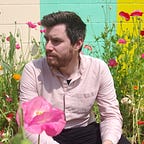What is Mastery?
The answer is easy, and we’ve implicitly known it our whole lives.
Ever since about 6 years ago, when I became a dad, I’ve had the fortune of being able to watch my two littles grow up. Growing-up, if you recall, has a lot to do with the basics. It starts with seeing, feeling, tasting – noticing familiar patterns.
Familiarity (coincidentally sharing the etymological root of family) is something we learn to seek-out from the big, new world around us. And over time we learn to master our ability to recognize the familiar. But this mastery is never final — it is always a “working knowledge” or a “working mastery” and we keep learning.
What about walking? Or talking? These things take some more time, but we apply ourselves to the learning journey all the same, and eventually we develop a working mastery of these things too.
Do we have goals when we do this?
Nope.
I can’t ever recall my children turning to me and giving me a S.M.A.R.T. goal for their walking and talking.
And yet, in the end they had completely transformed themselves from wordless rugrats to precocious little walkers and talkers.
Why?
Well, because… WHY.
They had a pretty strong why: to be like the walkers and talkers around them. To participate in that social, perambulatin’ world of adults and older kids. To survive in our physical and social world.
But again, they didn’t have their why written-up as a snappy vision statement, framed and hung above their beds.
Their why was just an implicit why that gave them the drive to keep trying, failing, doing.
As we grow up, mastery becomes less about the fundamentals like walking and talking, and more about things that we choose to get better and better at, for all sorts of different reasons (i.e. different whys). More than any other species on the planet, we humans are able to come up with different whys for different things that we want to master:
- I will learn to master flight, because I want to fly.
- I will learn to become a better partner and friend, because I want to share my love with those I care about.
- I will learn to master leadership, so that I can inspire teams to achieve awesome things.
And so on.
The animal is tethered tightly to their genes: a hawk will become a master hunter of the air; a gazelle a master runner and jumper; a mole a master digger; and so on. On many counts, like noticing, walking, talking, etc., the human is also tightly tethered.
But the human is pretty loosely tethered to its genes when it comes to mastering flight or computer programming. We aren’t tightly tethered to our genes across the full range of things we can learn to do: we’ve got a big gap between our genetic predisposition and the expression of said genes. We choose what we want to learn, and what we want to master, for all sorts of (ir)rational reasons. And over the years, we’ve stuffed that gap full. The range of potential things we can learn and master is immense.
Goals can be part of the process, but they are “accomplishables”. Mastery, like learning, is never-ending. So, I contend: before we are homo habitus, homo ludens, homo economicus, homo faber, we are…
Homo Cognoscens
… and if we commit ourselves to the learning and the deliberate practice, we become homo dominus.
But how do we commit ourselves to a path?
We get clear on our why.
Finding a why, finding a purpose, is like finding a place to tether our learning effort. It gives our learning an artful necessity. Completely made up by us, our purpose can be as related to satisfying our basic survival needs as we want it to be.
In the absence of a gene that directed the Wright Brothers to flap their wings and fly, they made one up for themselves and proceeded to invent an apparatus to help them master flight. But the learnin’ didn’t stop there. Others followed in their footsteps, learned what they did, mastered it, added to it. Now there are many things to master in the world of flight — being a master pilot being one of them.
The space of mastery is one of shared vision and inventiveness. It is easier to pursue under the guidance of a master, as an apprentice, alongside peers, inside a studio, workshop, school, dojo… invisible college. It involves everything we enjoy and celebrate in our culture: innovation, collaboration, excellence, focus, accomplishment, teamwork, and on and on.
Working Mastery
I believe that having a why that is tied to a broader social and ecological good is where things get really special. Because when we do this, our mastery is in service to ourselves and the broader world. It also quells our doubtful inner voices: for why am I doing this, if not for the betterment and enrichment of both myself and the broader community?
It is why I am starting my own fledgling school — my own invisible college of the changemaker and visionary leader. A place where we can borrow from the utilitarian and shallow worlds of self-help, business management, and productivity hacks, energizing these tired remnants of a dying global culture of “work for work’s sake”, tethering them to whys with deep power. Whys that are charged with deep purpose. Whys that commit us to mastering good, big work.
